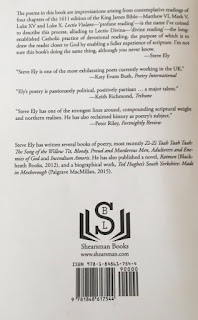At the end of the ITN News last night, there was an item about the Anchor Church at Ingleby, Derbyshire. The gist of it was pretty similar to this article, but they went rather more heavily on the 'discovery' that the caves were an Anglo-Saxon dwelling rather than belonging to the late medieval period.
I know the site pretty well. In my Nine Arches Press collection hydrodaktulopsychicharmonica, there's a poem called Dreams From The Anchor Church, at least partly inspired by it. I've been walking there quite a lot over the years. Memorably, about 10 years ago, I saw a Red-footed Falcon nearby, the only time I've ever seen the species in the UK.
I was a bit surprised by the TV piece, because I thought it had long been established that it was an Anglo-Saxon site. I remember talking about it as such when I was at university, in the late 80s/early 90s. I mentioned it to my lecturer (I suspect I had heard the local tradition that it was the home of an Anglo-Saxon saint), and she then pointed me in the direction of a book or possibly an article in a history journal that confirmed it.
It's strange, then, how knowledge gets lost, and found, and lost again, and refound, because this appears to be a case where the local folk tradition preserved an accurate recollection of the past. And given the amount of early medieval remains in the area (a couple of cemeteries of the Viking 'Great Army', and an Anglo-Saxon crypt in nearby Repton church that holds a couple of Mercian kings), it's surprising that this one was ever ignored.
The link with the church at Breedon-on-the-Hill is interesting, too. It appears possible that some of the wall friezes there were taken from the sarcophagus of St Hardulph, to some the church is dedicated, and who is likely to have been one and the same as Eardwulf, King of Northumbria.





